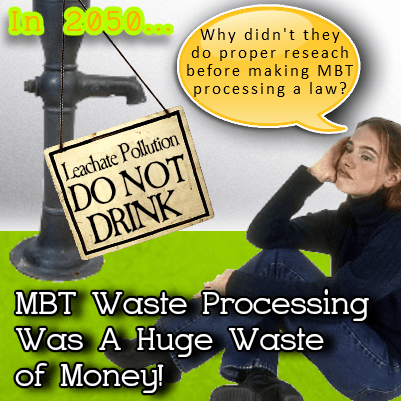![]()
![]() B
B ack in the 1990s the European Union (EU) passed a directive which must be complied with by all member states, with heavy fines for non-compliance. The stated aim was to substantially reduce landfilling and in particular the amount of organic matter being sent to landfill. Now, for improving the sustainability of the economies of Europe there are undeniably many good reasons for increasing recycling rates and reducing landfilling, not least since the land available for siting new landfills is very finite, and throwing materials into a hole in the ground hardly makes sense if they can be economically recovered, recycled and re-used and makes even more sense when you consider that the mining resources for raw materials are not finite either.
ack in the 1990s the European Union (EU) passed a directive which must be complied with by all member states, with heavy fines for non-compliance. The stated aim was to substantially reduce landfilling and in particular the amount of organic matter being sent to landfill. Now, for improving the sustainability of the economies of Europe there are undeniably many good reasons for increasing recycling rates and reducing landfilling, not least since the land available for siting new landfills is very finite, and throwing materials into a hole in the ground hardly makes sense if they can be economically recovered, recycled and re-used and makes even more sense when you consider that the mining resources for raw materials are not finite either.
This article in not about any of that and indeed we support waste minimization, re-use, and recycling.
It is in the field of MBT (Mechanical Biological Treatment), which is what is applied (in municipal waste processing facilities) to the organic waste that remains after everything recyclable has been mechanically sorted out from municipal solid waste waste, that we hold concerns that composting and equivalent processes which seek to reduce the biological activity within the organic waste fraction are costly and are not a proven process from the point of view that asks whether they have been shown to be worth the money spent on them.
We have written about this in more detail in an article about the effects of MBT on leachate which can be read here.
Are article is based on a research study carried out on the leachate from MBT waste, and here are the main conclusions:
The conclusions regarding future leachate strength from the study
The study confirmed that very high strength organic leachates would be generated if MSOR fractions of household wastes were landfilled without pre-treatment, and that:
- these can typically befrom twice to four times as strong as equivalent leachates from MSW landfills,
- and high organic strengths can persist for at least several decades.
However, such practices are not ever likely to be permitted and this simply illustrates that efficient Mechanical Biological Treatment of the MSOR fraction is essential if there is to be any benefit at all, and the study showed that good MBT treatment can considerably reduce the organic strength of leachates, avoiding the acetogenic phase, and more rapidly producing leachates similar to those from MSW landfills in methanogenic phases of decomposition.
Nevertheless, levels of “hard” COD in these leachates, not readily biodegradable by aerobic or anaerobic processes, are typically at least as strong as, and often stronger than those found in methanogehic leachates – often in the range 1000 to 4000 mg/l, in spite of BOD values which are frequently less than 100 mg/l.
Concentrations of ammoniacal-N and Kjeldahj-N in MBT leachates may be significantly lower than those from conventional MSW landfills, but the extent to which this occurs is variable, and not mecoprop), evidence from this study is that effective composting processes are able to reduce con-centrations significantly.
In the case of mecoprop, this is generally present at significant levels in leachates from MSW, and was present at up to 120 pg/l in leachates from landfilled MSOR. However, it was absent, or present at very much lower concentrations in leachates from composted residues.
In practice; the extent of removal of mecoprop from leachates, may well be a good surrogate measure of the efficiency of the composting process itself, to which waste fractions have been subjected.
Similarly, AOX values were very much lower in leachates from composted wastes, although there is doubt as to whether this is of any value in assessing risk from any specific trace organic compounds in these leachate samples.
In general terms, many landfills receiving MBT wastes will continue to pose risks to groundwater, and require aftercare periods similar to conventional MSW landfills that have become methanogenic.
There is no doubt that MBT processes have potential to reduce both organic strength, and concentrations of ammoniacal-N in leachates from such landfills, as well as the total mass release of these and other contaminants. However, even at such landfills, the extent to which timescales over which leachates will require management can be reduced significantly, remains to be determined.
Our Conclusion
Our expert view is that high quality composting treatment of the organic fraction of MSOR Â has not been justified, although the potential for serious pollution impacts from landfill leachate will be reduced to a degree, by the lower volume of this waste being landfilled, as this benefit is not large and not quantified in research.
Future pre-processed landfilled municipal waste even though it complies with the Landfill Directive, will remain in need of leachate treatment, and as the hard COD which is still present in the leachate is extremely difficult to treat without high energy use, the risk of future groundwater pollution endangering water supplies is not removed.
So, as the benefits of the very expensive final stage of MBT waste processing now being undertaken throughout the EU (to comply with the EU landfill directive), which is most likely costing taxpayer billions of pounds annually, have never been costed for tits environmental benefit, and therefore current MBT/ waste processing practice based upon the EU legislation is completely unjustified, and very likely to be nothing but a waste of money.




